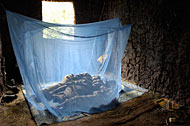The Carter Center Malaria Program Celebrates Successes in Ethiopia
6 March 2008

The Carter Center, in partnership with the ministry of health in Ethiopia distributed bed nets to fight malaria as part of an integrated health care delivery system. The Carter Center/L. Gubb
After launching its malaria program in 2006, The Carter Center moved quickly to supply a shortfall of 3 million LLINs, requested by the Ethiopian Ministry of Health to help reach Ethiopia's goal of 20 million LLINs to cover all households in malarious areas by mid-2007.
The nets purchased by the Center arrived in Ethiopia in early 2007 and were quickly and efficiently distributed to needy areas well before the target date of the Ethiopian Millennium, which was celebrated September 2007. All nets were distributed free of charge with a goal of providing an average of 2 LLIN to each household at risk of malaria.
Drop in malaria mortality in Ethiopia suggests impact of integrated malaria interventions
There has been widespread publicity in recent national and international media suggesting that large scale distribution of LLINs together with a switch to more effective malaria treatment (artemisinin combination therapy) has resulted in halving of malaria deaths in children in Ethiopia.
These findings are based on a rapid review of data collected from a sample of seven health facilities visited by World Health Organization (WHO) consultants to the Global Fund for AIDS, TB and Malaria. The consultants also noted a positive impact against malaria in other African countries not being assisted by The Carter Center (Rwanda and Zambia).
More work is needed
The Carter Center is committed to helping Ethiopia's Ministry of Health to conduct thorough assessments of the impact of malaria interventions in Ethiopia, through surveys, improvement of routine surveillance and application of new technologies. The first large household survey of malaria and net coverage was in 2006 (prior to distribution of the 3 million LLINs) in the country's three largest regions, where the Center also has programs in trachoma and river blindness.
In late 2007, The Carter Center collaborated with the Ethiopian Ministry of Health, MACEPA (Malaria Control and Evaluation Partnership in Africa), WHO, UNICEF and the President's Malaria Initiative (CDC/USAID) in a nationwide malaria indicator survey to determine whether the target net coverage has been achieved, and to establish a baseline for future evaluation. The results of this survey are being analyzed and will be released in April 2008. The Carter Center hopes and expects that its support for increased attention to routinely reported data on malaria cases from all health facilities will confirm the success of Ethiopia's malaria control program.
Congratulations to the Ministry of Health of Ethiopia and its Partners!
The Carter Center congratulates the Ethiopian Ministry of Health on its successful and rapid rollout of 20 million LLINs distributed free of charge in the last three years. The Carter Center is proud to be a major contributor to a monumental and pioneering malaria control program in Africa.
Back to Malaria Program or Carter Center main page
Adapted with permission from the Carter Center website,www.cartercenter.org, February 2009.

- Emily Staub
- Associate Director, Public Information
- Press Liason to the Health Programs
- Phone: 404-420-5100
- Email: carterweb@emory.edu
- www.cartercenter.org/health/index.html